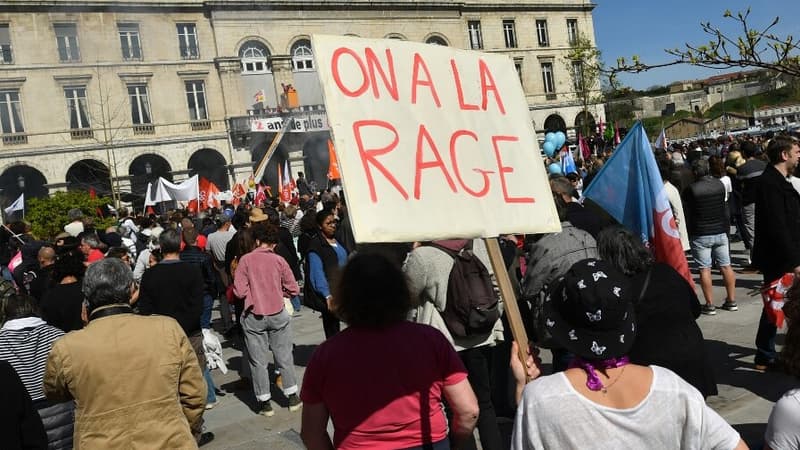Pierre, “a little disappointed” for a few days, is not sure if he will go out on Thursday. At 43, this employee of the Panthéon-Sorbonne University is “shared” with the idea of going to demonstrate again against the pension reform, especially since he has already hit the pavement in the capital six times since the beginning of year. at dawn of this new day of actionthis man does not hide that the duration of the social conflict begins to “weigh” on him.
On Thursday, France prepares to return to its 11th day of strikes and demonstrations, the day after a failed meeting between Elisabeth Borne and the inter-union. If the unions call for “a strong mobilization”, Jean-Luc Mélenchon feared “a weakening of the struggle” at the end of the demonstrations on March 28, where the number of demonstrators had slightly decreased.
“The withdrawals of wages begin to weigh”
If you continue to think that “we have to be there” on Thursday to “keep up the pressure” on the government, you are still beginning to be “confused about the bottom line.” “I’m not really sure we’ll win the case anymore…”, this administrative manager confides to BFMTV.com. “The Government does not listen to absolutely nothing of the messages that we want to transmit. For me, today we have reached the decision of the Constitutional Council”.
The Snuipp-FSU, the leading union in nursery and primary schools, foresees a drop in the number of strikers on Thursday compared to the last day of mobilization: “around 20%” of primary school teachers, compared to 30% from teachers on March 28. . “We feel that it is becoming more and more difficult for colleagues to go on strike,” Snuipp-FSU general secretary Guislaine David told AFP. “The withdrawals of wages begin to weigh”, which leads to “an economic sacrifice”.
“On demonstration days the work is not done, so I have to make up for it at the weekend,” confirms Pierre, who is forced to work in his free time, in addition to having lost about 900 euros net in his salary, or 150 euros per strike day from the start of the mobilization.
Hesitations due to physical and mental fatigue
“It is true that it is difficult to hold out over time, four months, it is starting to be long,” Camille also acknowledges, who will still join the ranks of the Lille event on Thursday. “Beyond the economic problems that arise, there is the physical and emotional exhaustion,” says the 29-year-old independent music teacher, who has participated in almost every procession in Lille since January.
“There are days that I think about the annulment of the CPE law (first employment contract, in 2016) and I tell myself that it is feasible, that we are going to get there, and others that I think about 49.3, about the fierce repression that is taking place. right now and then I’m not completely sure of myself,” confesses Valérie Mauduit, a computer engineer in Paris, who says she witnessed police violence and was tear gassed in the eyes for no particular reason as she headed for a quiet part of the procession.
“A Battle of Attrition”
Despite this, this 50-year-old Parisian plans to attend the next procession on Thursday. “I was really shocked, and I have to say that she scares me a bit… I don’t want my kids to go any further, but I think she would go anyway.”
In recent days, messages from disillusioned opponents of the reform have been able to flourish here and there on social networks, at the risk of sometimes arousing very virulent reactions. “Am I the only one who thinks we’ve already lost?” asked, for example, one “desperate” videographer on Twitter on Monday. “Tired” by these long weeks of struggle, another young woman – who did not want to be quoted – even called on Internet users to help her remotivate herself.
“Twitter I need your moral strength, in this battle of attrition against the pension reform and your government, I am losing,” he wrote on the social network, before qualifying:
“To the Front, No Row Moves”
Faced with the executive’s intransigence and “lack of consideration”, Camille says she understands that some people are tired or even discouraged. “What is hard mentally is that quite the opposite, no line is moved. There is no dialogue, nothing,” she says, “fed up” with “the haughty attitude of a government that does not want to hear anything.” “Last week I was completely unmotivated,” says the young master. “We no longer know what to do, what lever to activate so that they react.”
This is the reason why Benjamin, a 32-year-old engineer from Vincennes, has no intention of attending the Parisian procession on Thursday, unlike previous weeks. “It’s like talking or punching the wind,” explains Benjamin, “frustrated” by these weeks of mobilization that, according to him, “have not yet led to anything.” “That there are 3 million people on the street, that the country is blocked, they don’t care royally and they have made it clear.”
Despite these doubts and the relative pessimism that has hung over some of the troops in recent days, the French continue to mobilize massively against the pension reform. Three weeks after its adoption by 49.3 in the National Assembly, an Elabe poll conducted for BFMTV estimated that 73% of the French polled were in favor of his full retirement.
“Since the end of January, the approval of the mobilization has not declined and fluctuates between 60% and 68%,” underlines the survey, a dynamic that “distinguishes from the suffocation measured during the social movement against Édouard Philippe’s pension reform between November 2019 and January 2020.
Source: BFM TV


